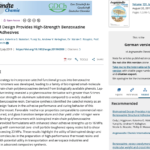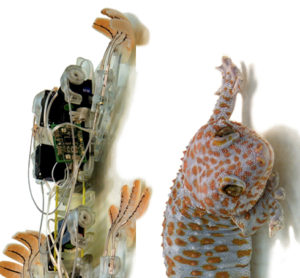Paper, Bioinspired Design Provides High-Strength Benzoxazine Structural Adhesives
A synthetic strategy to incorporate catechol functional groups into benzoxazine thermoset monomers was developed, leading to a family of bioinspired small-molecule resins and main-chain polybenzoxazines derived from biologically available phenols. Lap-shear adhesive testing revealed a polybenzoxazine derivative with greater than 5 times improved shear strength on aluminum substrates compared to a widely studied commercial benzoxazine resin. Derivative synthesis identified the catechol moiety as an important design feature in the adhesive performance and curing behavior of this bioinspired thermoset. Favorable mechanical properties comparable to commercial resin were maintained, and glass transition temperature and char yield under nitrogen were improved. Blending of monomers with bioinspired main-chain polybenzoxazine derivatives provided formulations with enhanced shear adhesive strengths up to 16 MPa, while alloying with commercial core–shell particle-toughened epoxy resins led to shear strengths exceeding 20 MPa. These results highlight the utility of bioinspired design and the use of biomolecules in the preparation of high-performance thermoset resins and adhesives with potential utility in transportation and aerospace industries and applications in advanced composites synthesis.
Learn about our two Decals!
 Click here to find out more about our Fall Bioinspired Design Decal and our Spring Bioinspired Design in Action Decal – ALL MAJORS are welcome.
Click here to find out more about our Fall Bioinspired Design Decal and our Spring Bioinspired Design in Action Decal – ALL MAJORS are welcome.Berkeley BioDesign Community
 Click here to learn about the BioD: Bio-Inspired Design @ Berkeley student organization or here to signup for more info.
Click here to learn about the BioD: Bio-Inspired Design @ Berkeley student organization or here to signup for more info.Search
Student Login




I imagine that the neurological circuits underlying these processes are governed by both 2d spacing maps with their brains as…
to reduce the impact of car accidents, it may be possible to study the force diverting physics of cockroaches to…
you see this type of head-bobbing stability in many avian creatures related to pigeons like chickens. the head ability to…
not like they taught horses how to run! this is an example of convergent evolution where both sea creatures and…
The brain functions in a similar way with neuronal connections. our brains are able to utilize the multiplicity of connections…